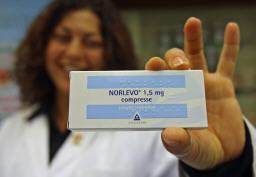A long-running debate over the abortion pill has flared up again, ahead of meetings this week expected to clear the way for the drug's introduction across Italy.
The RU486 pill was approved under the previous, centre-left administration nearly a year ago but tensions are mounting afresh as the Italian Pharmaceutical Agency (AIFA) prepares for the final licensing phase.
AIFA will meet on Tuesday and Thursday to consider the registration application by RU486's manufacturers, Exelgyn.
Much of the review will be little more than a formality, as the drug has already been used safely in a number of European countries for many years.
The only likely obstacle to its introduction could arise from a dispute over RU486's registered price in Italy, which AIFA and Exelgyn have yet to agree on.
The previous centre-left dominated parliament approved RU486 for national use in its final days, in the face of staunch opposition from the Vatican and a generally hostile attitude among much of the opposition.
The Vatican returned to the issue on Sunday, stressing that ''abortion is abortion, whether it is carried out in a clinic or at home'', while centre-right figures have also rejoined the debate, voicing caution or outright condemnation.
Isabella Bertolini, a prominent MP within Premier Silvio Berlusconi's People of Freedom (PdL) party, said the ''killer RU486 opens a dangerous path and poses a threat to women's health''.
Luca Volonte of the Catholic UDC described the abortion pill as ''a gas chamber for human embryos''.
Another PdL deputy Gabriella Carlucci, deputy chair of the Bicameral Childrens Committe, said she was deeply concerned at the thought of ''DIY abortions''.
Meanwhile, government figures were at pains to distance themselves from the abortion pill, recalling it had been approved by the last administration.
Welfare Undersecretary Eugenia Roccella said RU486 had many ''unexplored dark sides'' and claimed it was ''more painful, uncertain and psychologically devastating'' than other forms of abortion.
Youth Minister Giorgia Meloni said it was ''potentially dangerous to health'' although admitted it was no more dangerous than other forms of abortion.
But Livia Turco of the largest opposition group, the Democratic Left, accused critics of giving misleading information.
''The pill has been widely accepted and used in all European countries and Italy is one of the last simply because of ideological prejudices,'' said Turco, who was health minister under the last government.
Silvana Mura, an MP with the small Italy of Values party, suggested that critics had hijacked the debate because of their position on abortion, rather than out of genuine concern over the potential health risks.
''I can't help wondering whether those who are protesting against RU486 are actually concerned about the dangers of the pill or about the fact it will be used to terminate abortions,'' she said.
Medical abortions have been available in Italy on an experimental basis since 2005, in six of the country's 20 regions.
During the two-year experimental phase, RU486 was used in nearly 2,400 abortions.
Medical abortions have been available in France since 1989 and the UK since 1991, where they now account for about 40% of all terminations.
Nearly 20 of the European Union's 27 member states have approved RU486.
The majority of medical abortions take place in the first weeks of pregnancy.
Patients typically take two different medicines over two days, starting with RU486, which blocks the hormone that makes the uterus lining suitable for the fertilized egg. The second drug causes the lining to break down and the egg is lost at the same time.
In Italy, the drug has only been approved for supervised use in hospitals.









